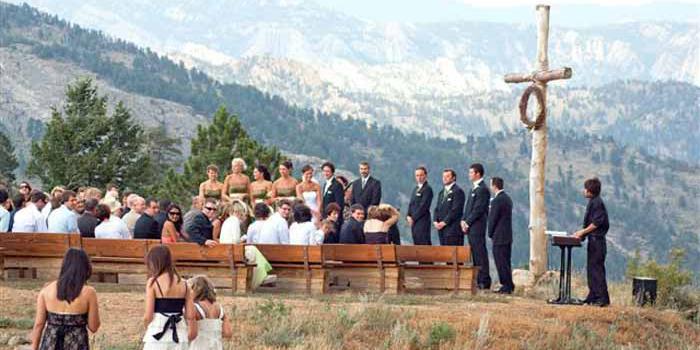Three weeks before their scheduled wedding date of April 4, 2020, Sam Lebow and Meghan Dworschak wrote a final check to the caterer for their reception.
“Two days later,” Sam said, “we had to postpone the wedding.”
The reason? COVID-19.
In 2019, Doug Dwyer officiated at 11 weddings. In 2020, he officiated at zero.
“They all cancelled, every single one,” explained Dwyer, senior pastor of Addisville Reformed Church in Richboro, Pa.
The reason? COVID-19.
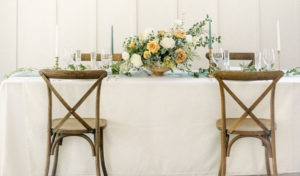 When Abby and Logan Misegades signed the papers to buy Margot Hill, a wedding venue in East Texas, in early March 2020, they projected 25 weddings for the rest of the year. They had eight.
When Abby and Logan Misegades signed the papers to buy Margot Hill, a wedding venue in East Texas, in early March 2020, they projected 25 weddings for the rest of the year. They had eight.
“We had given our lives to this new town and our new business,” Abby said, “and we had no idea when we’d be able to fulfill our dream.”
The reason? COVID-19.
The YMCA of the Rockies in Estes Park, Colo., hosted 105 weddings in 2019. In 2020, that number fell to 65. This year, it’s expected to reach 140.
“One-third rescheduled for 2021,” said Holly Cross, wedding and special event coordinator at the 124-year-old facility. “One-third cancelled and decided to marry closer to home with fewer people. One-third decided to go ahead with it, not knowing until the week before who would be able to come. Some we booked last minute from other venues in the area that had cancelled all their weddings.”
The reason? COVID-19.
In 2020, much attention was focused, and rightfully so, on the coronavirus and its ensuing deaths; on the courage of health care workers; on closings and reopenings; on the vaccine — in short, on the sorrows inherent in a pandemic. Yet it affected traditionally joyous occasions as well.
In 2019, 2.02 million marriages took place in the United States. In 2020, that number dropped to 1.26 million.
In 2019, according to The Wedding Report, 2.02 million marriages took place in the United States. In 2020, that number dropped to 1.26 million. This year, the organization predicts 1.9 million weddings — although the Delta variant may reduce that — and 2.5 million in 2022.
Those are the on-paper numbers. Here are real-life stories of the people behind those numbers.
The couple
Sam and Meghan, who live in Washington, D.C., met in December 2017 and became engaged on Memorial Day weekend 2019. They set the date and the location: a beach in Charleston, S.C., close to where much of Meghan’s family lives. When the lockdown began, they changed the date but kept the location. Then, in the interest of safety, they decided to keep the location but limit the guest list to only family.
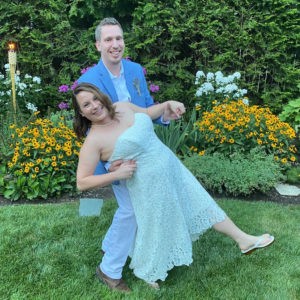
Sam Lebow and Meghan Dworschak
“About a week before that,” Megan said, “my twin brother called and said he had COVID, so we had to postpone even the smaller ceremony. We said forget it; there were just too many moving parts. We decided my parents can drive up here, and we had the wedding in Sam’s parent’s backyard.”
That was Aug. 1, 2020. Meghan wore her wedding dress, and in attendance were both sets of parents, Sam’s sister Nora, and the cantor who performed the service. Originally Meghan’s uncle, a Catholic priest, was going to perform the ceremony in Charleston, but the cantor stepped in when the venue changed. If the wedding goes through for its next planned date, Sept. 26, her uncle will officiate.
“If we can’t do it then, we won’t do it,” Sam said. “My parents rented houses for the family to stay in, and we have to cancel 30 days before the date or they’ll lose the money. The caterer said we can’t reschedule, so that will be more money we’re out. We’ve told guests they have to be vaccinated to attend so already our guest list is smaller.”
Many invitees are holding off saying whether they’ll be there, which Sam and Meghan understand.
“Everything is happening so rapidly,” Meghan noted. “People don’t want to commit to something that will happen tomorrow, much less in a few weeks.”
The last 18 months or so have been more stressful than they ever could have anticipated. In addition to working at busy jobs in education, dealing with ever-changing wedding plans and lost deposits, they’ve also recently bought a house on which they’ll close days before their latest wedding date. Plus Sam’s been planning their Greek honeymoon for two years — keeping fingers crossed it isn’t affected by the pandemic.
“People don’t want to commit to something that will happen tomorrow, much less in a few weeks.”
But with the support of their families and of each other, they stay emotionally afloat and looking forward.
“I just feel like if we can’t control something, there’s no sense in worrying about it,” Meghan said. “We’ve worked it out where we take turns on who is upset one day and who on the other. That’s helped out a lot. We know we can lean on each other.”
The planners
Abby and Logan first toured Margot Hill, the place that would become their home and their livelihood, in January 2020. COVID-19 was happening but was a world away from their idyllic 40 acres, large house, pond and swimming pool out in the country. The couple, who have three children, signed the papers in March. Two weeks later, the lockdown began.
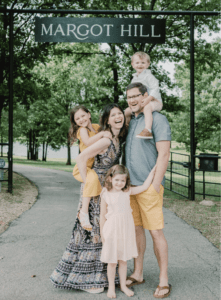
Abby and Logan Misegades and kids at Margot Hill
“Our faith was the only thing that got us through the miracle of even getting this place,” Abby said. “I didn’t know a soul in Malakoff, the town where we moved. I didn’t know it even existed. I was like, ‘Jesus, you’ll have to show up and provide. We’re against all odds right now.’”
They had anticipated 25 weddings for 2020. In reality, they had eight. For each, they put up signs warning of the risks of COVID-19 and emphasizing the need for social distancing. They ordered plenty of hand sanitizer and masks.
“At our first wedding, we had 11 people,” she said. “That was even breaking the rules, because at the time the limit for a group was 10.”
One wedding had to be postponed because the bridegroom and his mother tested positive for the virus less than a week before.
“They wanted to keep all the same vendors, so we had to coordinate with photographers, caterers, florists to make sure everyone had openings,” Abby explained. “It was a logistical nightmare, as you can imagine. But they had the wedding two weeks later.”
As restrictions have lifted and vaccines have become available, the number of weddings scheduled at Margot Hill has risen. Thus far, Abby said, the Delta variant has caused no cancellations. As of July, 24 weddings had been held; another 21 are on the books for the rest of the year.
The number of guests obviously has increased as well. But, Abby said, “it’s still low. It appears the trend now is to get your most important closest people instead of everyone you’ve ever met. I do like that.”
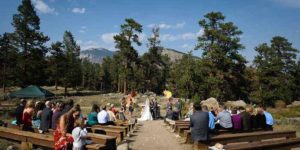 At the YMCA of the Rockies, Holly said restrictions were put in place during the pandemic. Serve-yourself buffet lines no longer were allowed. Guests had to enter only through one door and exit through another. Everyone had to wear masks.
At the YMCA of the Rockies, Holly said restrictions were put in place during the pandemic. Serve-yourself buffet lines no longer were allowed. Guests had to enter only through one door and exit through another. Everyone had to wear masks.
“We kept in constant contact with the Larimer County Department of Health and followed their guidelines,” she said.
Demand for the facility is so high now that couples are willing to get married any day of the week, not just the weekends.
“People feel fairly safe here at the Y, being in the mountains and outdoors,” she said.
The minister
When the pandemic hit, Pastor Doug said, weddings weren’t at the top of his concerns list.
“I had other things to worry about,” he explained; namely, the safety of parishioners and making sure the virtual services ran smoothly. The church put close to $40,000 into streaming equipment and cameras. Although the physical doors to the church have been reopened for more than a year, many members still choose to worship online.

Doug Dwyer
“I do give kudos to the two or three couples who had planned to be married last year and instead went to the justice of the peace, then waited until this year for me to marry them,” he said. “The others just postponed and rescheduled for this year. So far, I’ve done six and have several more in the future.”
Not all of them have been held at the church either. When one is at a different venue, he simply follows its rules for masks and social distancing.
“To couples, I would say that you need to hold loosely onto your plans,” the pastor advised. “There’s no guarantee you’ll be able to do the thing you want to do. For some, if they have to cancel their wedding again, they’ll be heartbroken. To them I’d probably say to have a small ceremony and I’d be happy to perform it. And when things quiet down, we can do a bigger wedding.”
Above all, he advises they take to heart this verse from Isaiah: “Be not afraid, for I am God.”
“I don’t believe you should be walking in fear,” he said. “You don’t want to live your life in fear, but do take appropriate precautions. Use the common sense the Lord gave you.”
Leslie Barker Garcia is a freelance writer based in Dallas.
Related articles:
Pulling off a wedding during a pandemic requires creativity and simplicity
Opting for non-church weddings crosses age, religious categories

